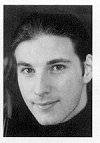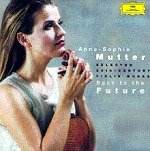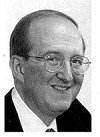Anne-Sophie Mutter's survey of 20th Century music in her repertoire is being promoted in a series of recitals and orchestral concerts, in association with the release of a 4-CD Deutsche Grammophon compilation of recordings from 1988-1997. She commands a wide following and was able to fill the Barbican for music by Bartok, Webern, Crumb, Penderecki and others who may be less off-putting to a general audience, but with nothing really to pull them in apart from her own reputation.It was an inspired choice to begin with Webern's Four Pieces Op 7 (1910), tiny elusive miniatures which established immediately that the audience had to actively listen. The third 'hovers on the edge of inaudibility' and coughs which broke the spell sounded like gunfire! Respighi's sonata did not demonstrate that its neglect is undeserved. George Crumb's characteristic Four Nocturnes (1964) required a separate prepared piano for its kaleidoscopic colouristic effects, Lambert Orkis diving iside the piano to play on its strings, at the end with a wire brush, and producing a variety of 'pizzicato effects, harmonics and bell-like sounds' which tended to upstage the violinist. Pleasant enough, but leaving puritan-inclined listeners with a slightly guilty feeling that colour alone may not be sufficient? Bartok's redressed the balance and his Sonata No 2 (1921-2) was the high spot of the first evening, both musicians interacting in this uncompromising and radical score, its construction sometimes suggesting chance collision rather than a shared discourse. It offered a constantly absorbing and challenging soundscape, one that is hard to capture fully even with repeated hearings. The duo partnership was at its best here and it is a high spot also in the recorded collection, as well as being the only item with Lambert Orkis, Mutter's regular recital pianist. Ravel's Tzigane fell short of gypsy abandonment - she had already played the series in New York and 12 USA cities, so there must be a problem in recreating spontaneity.

Daniel Muller-Schott Lambert Orkis
The second evening began well with the inescapable Fratres by Arvo Pärt, known in a myriad of instrumental versions, this one, mercifully, the most elaborate of them, with tricky violin figurations which held the attention. A strong performance of Shostakovich's Piano Trio No. 2 introduced an excellent young cellist, Daniel Müller-Schott, for whom the reversal of its opening was child's play. Amazing to recall how, in the 1950s, that high cello melody on harmonics, with the violin far below, was fraught with disaster, and one sighed with relief when this, then still freakish, passage was done with! How basic instrumental playing technique has changed in a few decades.
Stravinsky's Pulcinella/Pergolesi Suite was played with super-refined elegance and wicked wit to enormous enjoyment, and this lightening of the atmosphere was welcome before the world premiere of Penderecki's new Violin Sonata No. 2. Commissioned by Anne-Sophie Mutter, this is a lucid, half hour structure in five symmetrical movements, slow ones to start and finish, two scherzo-type fast movements framing a central Nocturne which accelerates into a waltz. Semitone-dominated motifs are clearly recognisable in their transformations. Penderecki is no longer an avant-gardist. This is determinedly serious music with a strong, immediate appeal; the sonata and its composer were both received enthusiastically. On a first hearing I was impressed by the first half, unsure whether the latter part was over-extended. I expect Mutter will soon record this latest addition to her expanding contemporary violin repertoire, for her an exciting career development, which she attributes to the enthusiasm of Paul Sacher.
The CDs [Deutsche Grammophon 463 790-2] include Penderecki's massive 2nd Violin Concerto Metamorphoses (1992-95), a single movement lasting 38 minutes, and Wolfgang Rihm's Time Chant, both of which can be heard at the Barbican on 7 May, an occasion not to be missed.
Peter Grahame Woolf


 Return to:
Return to: